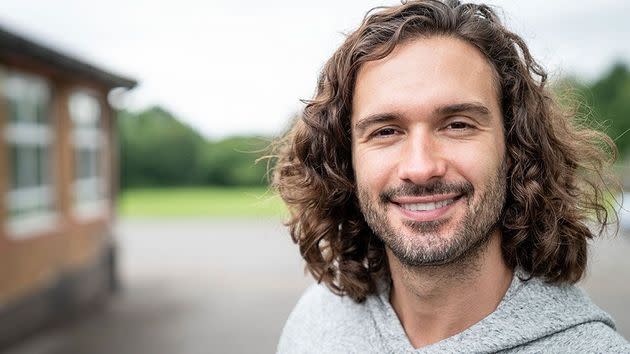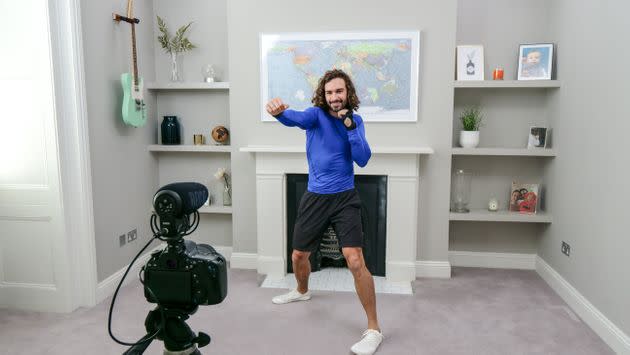7 Things We Learned From Joe Wicks: Facing My Childhood

(Photo: James Ross/BBC)
When the pandemic closed schools in March 2020, Joe Wicks stepped in to keep the world active with a daily YouTube workout, titled ‘PE with Joe’.
The videos reached more than 100 million people worldwide, proving as popular with adults as they were with kids. And no one was more surprised by the global success than the 36-year-old from Epsom.
More than two years on, Joe (aka The Body Coach) is still receiving messages from people thanking him for improving their mental health, as well as keeping the nation moving.
And the experience has led to Wicks reflecting more deeply on his own life experiences.
In a new BBC documentary, Joe Wicks: Facing My Childhood, he speaks about growing up in a household where his parents were impacted by mental illness. His dad used heroin, while his mum struggled with multiple illnesses at different times, including OCD, anxiety and an eating disorder.
“My mum and dad were up and down, up and down my entire life,” he says in the programme. ”I remember being the child in that scenario, being so upset and confused and lost. It was really tough.
“I worry about what impact parents’ mental health is having on kids. And how my own childhood is affecting me.”
There follows an illuminating discussion of the reality of living with a parent impacted by mental illness. Here are six things we learned.
1. This is a really widespread issue
Being the child of a parent who’s mentally ill can feel incredibly isolating, but the documentary highlights just how common this experience is.
We hear that there are upwards of three million children in the UK living with a parent with mental illness. That’s about six children in every class.
NHS England and the Centre for Mental Health has forecasted that in the next few years, more than 10 million people will need support for their mental health as a direct result of the pandemic, so this problem is only going to get bigger.
2. Holistic family support is practically non-existent
Wicks visits Our Time, the UK’s only charity dedicated specifically to helping children growing up with a parent impacted by mental illness.
Children can attend workshops and engage in play-based activities to help them understand their parent’s mental health. Crucially, these sessions drive home the message that it’s never the child’s fault.
Each year, the charity is able to work with 300 families, even though at least three million children could do with this support.

Joe Wicks found global fame thanks to 'PE with Joe'. (Photo: Comic Relief via Getty Images)
3. We need to talk to kids about mental illness
Wicks reveals that as a child, he thought he wasn’t “good enough” and blamed himself for his father’s drug use. He also says his dad’s addiction and mum’s mental health problems were never directly spoken about at home.
He meets Dympna Cunnane, psychologist and founder of Our Time, who says it’s a mistake for parents to try to ‘hide’ their mental illness to protect their children, because children pick up more than you think.
“Children know everything that’s going on at home and they worry about their parents. And most children want their parents to be happy,” she explains.
“So if your parents have any mental illness – like OCD, eating disorders, depression and anxiety, or whatever they’re experiencing – by not talking about it, it leaves the child feeling confused and maybe even feeling responsible for not being able to make the parent happy or not being able to fix the situation.
“It’s often the case that parents have never spoken to their children. But it’s that silence that leaves people struggling alone and it leaves children struggling alone.”
4. Kids find different outlets
We hear from Cunnane that children have different responses to living in a home where mental illness is prevalent. Some children show signs of hyperactivity and difficulty concentrating at school – something which Wicks relates to heavily.
He describes running five miles to school instead of getting the bus, because “it was the best way of letting go of all those feelings”.
As he revisits his old school and childhood home, he has difficulty piecing together some memories from his childhood.
“I suppose I’ve just compartmentalised the feelings and the experiences and blocked it out as best I can,” he says. “And maybe that’s a natural defence mechanism, because why would I want to bring that into my mind? Why would I want to focus on that? Maybe that’s just a natural response to stressful traumatic experiences – close it, put it away and don’t go there.”
5. Parental mental illness can impact your own outcomes
There’s a link between a parent experiencing mental illness and experiencing mental health issues yourself.
We learn that children with mental health disorders are nearly three times more likely to have a parent with poor mental health.
We also hear that some children go on to repeat their parents behaviour as adults, while others are able to “break the cycle”.
“I learned to slam doors because my dad slammed doors. And I learned to punch walls because my dad punched walls,” says Wicks. “Now as a parent, I don’t want to be that person. I’m really trying so hard to break that cycle.”
6. But parents shouldn’t feel guilty
A number of parents in the show express the shame attached to mental illness. Wicks’ own mum says this is partly what prevented her from getting help for a long time.
“It’s the shame, the guilt… protecting you. I think there was a fear element that if social services knew what was going on, social services would get involved and that you would be taken away from me,” she says. “That really frightened me.”
But Wicks says he thinks people who get help are “the best parents in the world” – something echoed by other children in the programme.
7. Wicks is doing way more than the odd fitness video
The Body Coach is fast becoming the wellbeing coach. Although he doesn’t profess to be a mental health expert, Wicks receives thousands of DMs per day and always tries to respond to people who’ve messaged him about their mental health.
We learn that he’ll sometimes spend seven or eight hours replying to DMs, but that his inbox his still full. His wife, Rosie, is full of admiration, but is also concerned about the impact on him, because he can’t “save everyone”.
“He has taken on so much that he doesn’t really have downtime,” she says. “Sometimes I think he needs to just have moments to himself.”
Joe Wicks: Facing My Childhood airs on BBC One on May 16 at 9pm (and is then available on BBC iPlayer)
Help and support:
Mind, open Monday to Friday, 9am-6pm on 0300 123 3393.
Samaritans offers a listening service which is open 24 hours a day, on 116 123 (UK and ROI - this number is FREE to call and will not appear on your phone bill).
CALM (the Campaign Against Living Miserably) offer a helpline open 5pm-midnight, 365 days a year, on 0800 58 58 58, and a webchat service.
The Mix is a free support service for people under 25. Call 0808 808 4994 or email help@themix.org.uk
Rethink Mental Illness offers practical help through its advice line which can be reached on 0808 801 0525 (Monday to Friday 10am-4pm). More info can be found on rethink.org.
This article originally appeared on HuffPost UK and has been updated.

